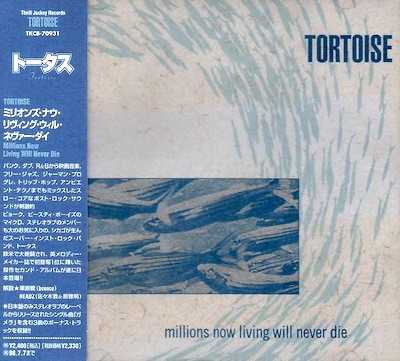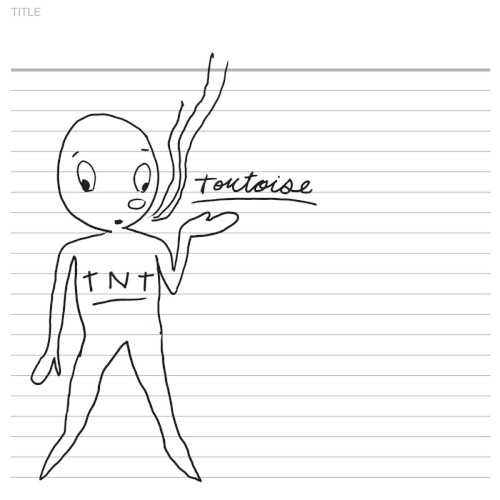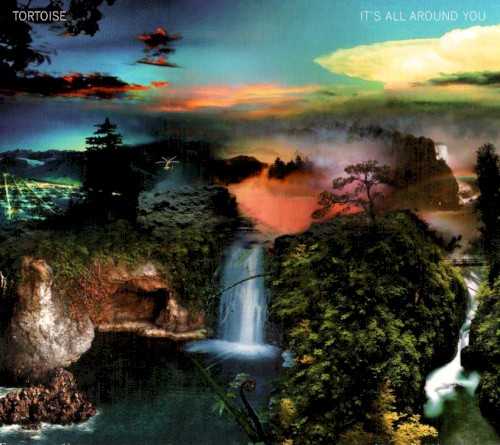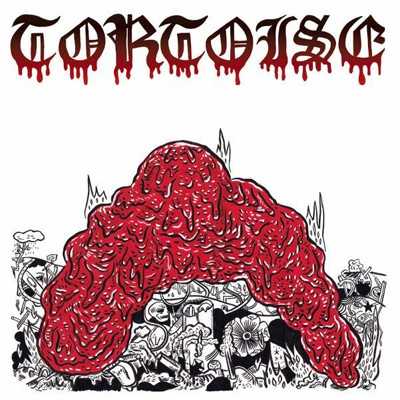Tortoise | ||
| Allmusic Biography : Tortoise revolutionized American indie rock in the mid-90s by playing down tried-and-true punk and rock & roll influences, emphasizing instead the incorporation of a variety of left-field music genres from the previous 20 years, including Krautrock, dub, avant-garde jazz, classical minimalism, ambient and space music, film music, and British electronica. At odds as well with the shambling framework of alternative rocks normal song structure, the group -- as large as a septet, with at times two vibes players -- relied on a crisp instrumental aesthetic, tied to cool jazz, which practically stood alone in American indie rock by actually focusing on instrumental prowess and group interaction. Although the groups unique vision is to an extent the creation of drummer and master producer John McEntire, most of the other members are well-connected -- producers and/or participants -- in Chicagos fraternal indie rock community, which consists of numerous side projects and ongoing bands. After debuting in 1993 with several singles and an LP, Tortoises underground prestige emerged above terra firma with their second album, Millions Now Living Will Never Die; the 21-minute opening track "Djed" was a sublime pastiche of Krautrock, dub, and cool jazz. Tortoise then linked themselves with the cream of European electronica (Luke Vibert, Oval, U.N.K.L.E., Spring Heel Jack) to remix the album on a series of 12" singles. Despite the bands growing reliance on studio engineering, Tortoise began re-emphasizing their instrumentalist bent in 1998 for their third album, TNT. First formed in Chicago in 1990, Tortoise began when Doug McCombs (bass; formerly of Eleventh Dream Day) and John Herndon (drums, keyboards, vibes; formerly with the Poster Children) began experimenting with production techniques. The duo intended to record on their own as well as provide an instant rhythm section for needy bands -- inspired by the reggae duo Sly & Robbie. Next aboard was producer/drummer/vibes player John McEntire and guitarist Bundy K. Brown (both former members of Bastro) plus percussionist Dan Bitney (formerly with the SST hardcore band Tar Babies). The five-piece recorded 7" singles for both David Wm. Sims Torsion label and Thrill Jockey in 1993, then released their eponymous debut on Thrill Jockey one year later. Much of the albums sound -- restrained indie rock with sublime jazz influences and a debt to prog rock -- was pleasant but not quite revolutionary. Several tracks took a more slanted course, though, sounding like a reaction to Englands ambient/techno scene filtered through the 70s experimentalism of Can and Faust. Tortoise became an underground classic and spawned the remix work Rhythms, Resolutions and Clusters featuring remixers Jim ORourke, Steve Albini, and Brad Wood; the album steadily segued from techno and found-sound environment recordings to feedback ambience and hip-hop, complete with samples of A Tribe Called Quest and Minnie Riperton. In 1995, the group released Gamera, a 12" single on Stereolabs Duophonic label. Brown later left for solo production work and his band projects Slowpoke and Directions in Music; Tortoise added bassist David Pajo (formerly of Slint and also a member of the For Carnation) for second album Millions Now Living Will Never Die, released in early 1996. Much of the album was similar to the debut, but the British weeklies and American music magazines championed the strength of album-opener "Djed" -- which blended a rumbling bassline, scratchy lo-fi ambience, and dub techniques into over ten minutes of music before the sounds of reel-to-reel tape disintegration introduced another passage of calm yet angular indie rock figures. During the rest of 1995, Tortoise toured with Stereolab in England and headlined a U.S. tour with 5iveStyle and the Sea and Cake. John McEntire also remained busy with production, working on Stereolabs Emperor Tomato Ketchup and eponymous debut LPs from 5iveStyle, Trans Am, and Rome. Instead of a remix album to accompany Millions Now Living Will Never Die, Tortoise optioned tracks out to several techno/experimental contemporaries during 1996. Mo Wax heroes U.N.K.L.E. recorded a remix of "Djed" on the first of what became a four-volume series, with later interpretations coming from Oval, Jim ORourke and Bedouin Ascent, Spring Heel Jack, and Luke Vibert, among others. By the time recording began in 1998 for Tortoises third album, TNT, Pajo had gone to spend time on his Aerial-M project; a longtime group friend, guitarist Jeff Parker, replaced him. Parkers connection to the fertile Chicago free jazz community -- hes a member of the Association for the Advancement of Creative Musicians (AACM) -- served as a signpost to the groups new direction: growing instrumental prowess and an emphasis on straight-ahead, occasionally improvisational indie rock. Tortoises fourth album, Standards, released in early 2001, maintained that direction, only leavened by many post-recording tweakings at the bands Soma Studios. Another three-year gap separated Standards from 2004s Its All Around You. The bandmembers then took a break, of sorts, concentrating on their raft of side projects -- Exploding Star Orchestra, Bumps, Fflashlights, Powerhouse Sound -- and producing only a collaborative Tortoise LP with Bonnie "Prince" Billy, The Brave and the Bold. (They also assembled a box set titled A Lazarus Taxon.) The groups sixth proper LP, Beacons of Ancestorship, finally arrived in 2009. The following year, the Japanese release Why Waste Time? appeared, featuring the previously unreleased songs "Rubaiyat" and "Passerine." The band also composed the score to Lovely Molly, a film by The Blair Witch Project director Eduardo Sánchez that debuted at 2011s Toronto International Film Festival. Tortoises seventh full-length, The Catastrophist, built on music that they were commissioned to write in 2010 by the City of Chicago to commemorate the areas jazz and improvised music scenes. Featuring vocals from U.S. Maple/Dead Riders Todd Rittman and Yo La Tengos Georgia Hubley, the album arrived in January 2016. | ||
 | Album: 1 of 13 Title: Tortoise Released: 1994-06-22 Tracks: 10 Duration: 50:18 Scroll: Up Down Top Bottom 25% 50% 75% Spotify Allmusic Wikipedia AlbumCover | 1 Magnet Pulls Through (04:38) 2 Night Air (03:50) 3 Ry Cooder (07:06) 4 Onions Wrapped in Rubber (06:40) 5 Tin Cans & Twine (04:23) 6 Spiderwebbed (08:34) 7 His Second Story Island (02:42) 8 On Noble (04:09) 9 Flyrod (03:28) 10 Cornpone Brunch (04:44) |
| Tortoise : Allmusic album Review : An album that not only set the tone for the new Chicago prog rock, but also cemented the musical niche for Thrill Jockey Records. Here, multi-instrumentalists John McEntire, Dan Bitney, John Herdon, Douglas McCombs, and Bundy K. Brown share equal responsibility and trust in each other, pouring out a thick stew of meditative grooves, light production experiments, and rusty guitar-string ambience -- the likes of which have rarely sounded so approachable, but this is not to say the album is a sellout leap into commercialism. There are a couple head scratchers and murky moments that fail to make much of an impact, but the quintet have spun such a rich web of mood and personality that any fall from grace barely changes altitude. Steady frontman McEntire wades confidently through uncharted waters, and his strength as a producer keeps a few odd moments from sinking. Tortoise sounds like a dark and wonderful garage full of dusty instruments. Its like looking at Avedon photographs -- the crevices and quirky imperfections are so richly explored that they become things of beauty. Disjointed twangy guitar riffs, distant harmonic overtones, bass mumblings, and a heartbeat make up tracks like "Flyrod," and "Ry Cooder" ebbs and flows organically through multiple key changes, tempos, and moods: foreboding, tense, plodding, explosive, hip, jazzy, cool, and funky (a signature piece for the band). "Cornpone Bunch" briefly tips its hat to the Who before unraveling a roll-the-credits finale to the disc: a bittersweet dialogue between bass, vibes, and drums than builds wonderfully to a close. The modest success of this CD proved to be a launching pad for several offshoot projects (several of which included founding members of this band), like Directions in Music, Isotope 217, Trans Am, Rome, and the Sea and Cake. In subsequent releases, Tortoise evolved to be a collective rather than a set roster of players. The ground broken apart by this solid debut would be tilled and cultivated by their outstanding follow-up Millions Now Living Will Never Die. Roll the dice for either album; you cant lose. | ||
 | Album: 2 of 13 Title: Millions Now Living Will Never Die Released: 1996-01-30 Tracks: 6 Duration: 43:02 Scroll: Up Down Top Bottom 25% 50% 75% Spotify Allmusic Wikipedia AlbumCover | 1 Djed (20:57) 2 Glass Museum (05:29) 3 A Survey (02:52) 4 The Taut and Tame (05:01) 5 Dear Grandma and Grandpa (02:49) 6 Along the Banks of Rivers (05:51) |
| Millions Now Living Will Never Die : Allmusic album Review : Tortoises production expertise hit an early peak with Millions Now Living Will Never Die, a work that not only references studio-centric forms like dub and electronica, but actively welds them to the groups aesthetic of sturdily constructed indie rock. The centerpiece is the 21-minute opener "Djed," a multi-part track which brought Tortoises already impressive compositional abilities to a grand scale. Its almost a history of influences in miniature, first referencing tape music and dub for several minutes, then moving on to Krautrock with a chugging section incorporating wheezing organ and understated guitar chords. Halfway through, the band takes on minimalism with repeating figures of organ and vibes, then return to the green fields of their debut with a final few minutes of moody indie rock (though even this is spiced with a scratchy rhythm and various noise effects). With "Djed," Tortoise made experimental rock do double duty as evocative, beautiful music. The other songs on Millions Now Living are hardly afterthoughts, though; highlights "Glass Museum" and "The Taut and Tame" display the band quickly growing out of the angular indie rock ghetto with exquisite music, constructed with more thought and played with more emotion, than any of their peers. | ||
 | Album: 3 of 13 Title: A Digest Compendium of the Tortoise’s World Released: 1996-07-08 Tracks: 15 Duration: 1:15:58 Scroll: Up Down Top Bottom 25% 50% 75% Allmusic AlbumCover | 1 Tin Cans & Twine (03:43) 2 Tin Cans & Twine (Puerto Rican mix) (04:00) 3 Alcohall (04:01) 4 Night Air (03:53) 5 Gooseneck (05:36) 6 Onions Wrapped in Rubber (06:40) 7 Spiderwebbed (07:19) 8 Cobwebbed (02:35) 9 Your New Rod (04:23) 10 Ry Cooder (The Beer Incident) (11:50) 11 Not Quite East of the Ryan (05:08) 12 Reservoir (02:08) 13 Cornpone Brunch (04:44) 14 Whitewater (05:05) 15 Initial Gesture Protraction (04:47) |
| A Digest Compendium of the Tortoise’s World : Allmusic album Review : A Digest Compendium of Tortoises World includes selections from the bands self-titled Thrill Jockey debut, some early singles and a host of remixes. Recruited for mixing duties are Jim ORourke, Steve Albini, Casey Rice, the band themselves and a host of others. The result is a comprehensive account of Tortoises initial efforts, and some rather unique reinterpretations. There is a sprawling remix of "Ry Cooder," dubbed "Ry Cooder (The Beer Incident)." It is the audible account of a man returning home, cracking open a beer and tuning in to "Ry Cooder" on the radio. Another great track is Casey Rices interpretation of "Spiderwebbed," called "Cobnebbed." It is a two-minute exploration into the far reaches of space, and the most interesting remix on the album. Bundy K. Brown tweaks "Spiderwebbed" as well, but the result is astonishingly different than Rices. Browns mix, titled "Not Quite East of the Ryan," begins with a 50-second ambient trance similar to Rices mix, but abruptly shifts directions with the inclusion of a hip-hop backbeat and a Tribe Called Quest sample. Along with these remixes are some of Tortoises earliest material; their first single "Reservoir" is included, as is "Whitewater." This album lives up to its title, and provides a comprehensive collection of Tortoises early work. Although at times the album seems a bit disjointed in switching so quickly from song to remix to song, it is a great introduction to the band and contains some hidden treasures for fanatics. | ||
 | Album: 4 of 13 Title: Remixed Released: 1996-10-21 Tracks: 9 Duration: 1:05:22 Scroll: Up Down Top Bottom 25% 50% 75% Allmusic AlbumCover | 1 DJ ED (Bruise Blood mix) (08:08) 2 TJED (07:30) 3 Bubble Economy (06:04) 4 Learning Curve (03:54) 5 Galapagos (version one) (07:11) 6 Reference Resistance Gate (08:47) 7 Taut & Tame (06:37) 8 Find the One (11:07) 9 Ten-Day Interval (Adverse Camber) (06:00) |
| Remixed : Allmusic album Review : Picking up where Rhythms, Resolutions and Clusters: Remixed and Rare left off, the release of Tortoises Remixed is a reworking of material from Millions Now Living Will Never Die. Remixed is quite an eclectic compilation, featuring the work of Jim ORourke, Ovals Markus Popp, Bundy K. Brown, and others. The album also features Tortoise member-to-be Jeff Parker, as well as a Tortoise remix of Yo La Tengos "Autumn Sweater." Some of the mixes stick to the original song forms, but the most successful ones depart from the preordained structure. ORourkes "Reference Resistance Gate" is a brilliant interpretation, the best of the album. "Taut and Tame," remixed by Wagon Christs Luke Vibert, results in jungle-Tortoise. "Wait," which is not a remix but a new song, is a formidable effort and reflects the a marked growth from Millions. This version of "Autumn Sweater" does justice to the already interesting tune through Tortoises tinkering. This album is well worth the ORourke remix alone, but contains other standouts. It presents a fresh outlook on much of the material composed for Millions. | ||
 | Album: 5 of 13 Title: TNT Released: 1998-03-09 Tracks: 12 Duration: 1:04:54 Scroll: Up Down Top Bottom 25% 50% 75% Spotify Allmusic Wikipedia AlbumCover | 1 TNT (07:33) 2 Swung From the Gutters (05:52) 3 Ten-Day Interval (04:44) 4 I Set My Face to the Hillside (06:08) 5 The Equator (03:42) 6 A Simple Way to Go Faster Than Light That Does Not Work (03:33) 7 The Suspension Bridge at Iguazú Falls (05:38) 8 Four-Day Interval (04:45) 9 In Sarah, Mencken, Christ, and Beethoven There Were Women and Men (07:29) 10 Almost Always Is Nearly Enough (02:42) 11 Jetty (08:21) 12 Everglade (04:21) |
| TNT : Allmusic album Review : Expected by many to continue leading the post-rock brigade into a new fusion with dub and electronics, Tortoise instead turned yet another corner with their third album, TNT. Adding guitarist Jeff Parker to cement their musicianship as well as their connections to Chicagos fertile jazz/avant-garde scene, the band returned with a record of post-modern cool jazz, only slightly informed by the dub, Krautrock, and electronics of Millions Now Living Will Never Die. It shows from the first few seconds -- a lazy, slightly free drum solo frames a few tentative guitar chords and some teased effects, before the band kicks in with a holds-barred jam that encompasses a tremulous solo from trumpeter Rob Mazurek. With engineer/mixer/drummer John McEntire and company adding only a few post-production frills to the mix -- and those so complementary and subdued that they rarely even sound like effects -- TNT comes off as a surprisingly organic record. The evocative Spanish-style guitar on "I Set My Face to the Hillside" plays over an assortment of playground sounds, while "The Suspension Bridge at Iguazú Falls" deconstructs a classically angular Tortoise groove and re-emerges with an evocative, deeply affecting groove over shimmering vibes and precision guitar lines. There are plenty of nods to post-rock touchstones like Krautrock ("Swing From the Gutters"), dub, and minimalism ("Ten-Day Interval"), but Tortoise hardly sounds like a difficult band here. Instead of forcing studio experimentation to become an end to itself, the band mastered -- with a single, deft statement -- the far more difficult lesson of making technology work for the music. | ||
 | Album: 6 of 13 Title: In the Fishtank, Volume 5 Released: 1999-05 Tracks: 6 Duration: 22:49 Scroll: Up Down Top Bottom 25% 50% 75% Wikipedia AlbumCover | 1 The Lawn of the Limp (04:06) 2 Pooh Song (Christopher Robins Nightbear) (04:57) 3 Central Heating (02:18) 4 Pleasure as Usual (05:07) 5 Did You Comb? (02:09) 6 Huge Hidden Spaces (04:12) |
 | Album: 7 of 13 Title: Standards Released: 2001-02-19 Tracks: 10 Duration: 44:23 Scroll: Up Down Top Bottom 25% 50% 75% Spotify Allmusic Wikipedia AlbumCover | 1 Seneca (06:20) 2 Eros (04:26) 3 Benway (04:46) 4 Firefly (03:56) 5 Six Pack (03:11) 6 Eden 2 (02:08) 7 Monica (06:30) 8 Blackjack (04:07) 9 Eden 1 (02:36) 10 Speakeasy (06:18) |
| Standards : Allmusic album Review : Revered for their ineffably clean, precise playing, Tortoise couldnt help but mess with the formula slightly on their fourth album, Standards. And from the beginning of the first track it sounds like a major overhaul, with heavily over-miced drums and distorted guitars framing a pummeling groove from bassist Doug McCombs. On the second track "Eros," the phlegmatic synthesizer lines and clipped drums are more reminiscent of experimental electronica outfit Mouse on Mars than any fellow post-rock luminaries. When the band finally hits its stride, though, midway through the third track, "Benway," its with a quintessential Tortoise groove, driven by repetitive bass figures and a vibraphone melody (plus a hilarious nod to prog-rock at the end, with several seconds of stop-start playing). Standards does return the group to the green fields of their last record, but only occasionally; John McEntire and company appear too restless to consider making the same album twice. Ironically, despite the range of sounds, Tortoise is still doing what theyve been doing for nearly a decade: playing some of the most empathic, group-minded rock of their era, then indulging in much recomposition courtesy of the mixing desk and various effects. "Monica" is one of the least Tortoise-sounding tracks the group has ever recorded; it sounds like an early-80s pop/R&B; track (complete with talkbox guitar) filtered through the lens of British IDM, but then mutates into an intriguing stereo-separation drum workout. Overall, Standards has a few detours for fans conscious of any bands "progression," but plenty of interesting songs and great musicianship for less vested listeners. Though it doesnt develop the evocative or impressionistic side of Tortoise (as heard on TNT), the band is certainly as inventive as ever. | ||
 | Album: 8 of 13 Title: It’s All Around You Released: 2004-04-06 Tracks: 10 Duration: 43:42 Scroll: Up Down Top Bottom 25% 50% 75% Spotify Allmusic Wikipedia AlbumCover | 1 It’s All Around You (04:09) 2 The Lithium Stiffs (03:59) 3 Crest (04:21) 4 Stretch (You Are All Right) (05:14) 5 Unknown (05:38) 6 Dot / Eyes (03:46) 7 On the Chin (05:21) 8 By Dawn (01:51) 9 Five Too Many (04:33) 10 Salt the Skies (04:45) |
| It’s All Around You : Allmusic album Review : Tortoise only release an album about once every three years, and their style is one of the most distinctive in rock music, so a record that fails to push them forward can hardly be termed a failure. And yet, Its All Around You is a disappointment since its clear the quintet is in a holding pattern, making music derivative of old glory TNT and even its shabbier successor, Standards. Everything is in its place here, every shuddering bassline or wheezing synthesizer or ringing vibraphone; every minimalist repetition of a theme, accompanied by subtly changing counterpoint; every pause before the band reworks the theme from a slightly different angle. Everything in its place, all part of a process that goes back in a direct line to Tortoises self-titled debut of 1994. Certainly, they have matured in a decade of work; the members of the band have grown as musicians, as producers, and as engineers. Theyve even grown as compilers and sequencers of their material -- the pacing and transitions are masterful during the first four songs, which nearly comprise a suite of unified compositions to rank near their masterpiece "Djed." Second song "The Lithium Stiffs" floats over a bed of wordless harmony vocals while a clipped percussion line segues into an exploratory dub clatter, devolving into chaos just before moving to the aptly titled "Crest," an evocation of cinematic stateliness that goes well beyond anything the usually informal Tortoise has ever recorded. But Its All Around You soon becomes just another Tortoise record, so close to previous records in composition and execution that its virtually deja vu for any listeners who know the band well. Members of the band, as well as some fans, would argue that the Tortoise aesthetic isnt to continually push their music forward (as would their compatriots in post-rock) but to continue seeking a clearer expression of their methods (as would an experimental or jazz outfit). In the end, though, its a philosophical argument, not a musical one. Hearing Tortoise play music derivative of Tortoise is an enjoyable experience, but to be faced with a record so familiar from a band once so fresh is clearly a disappointment. | ||
 | Album: 9 of 13 Title: The Brave and the Bold Released: 2006-01-23 Tracks: 10 Duration: 39:44 Scroll: Up Down Top Bottom 25% 50% 75% Allmusic Wikipedia AlbumCover | 1 Cravo é Canela (03:09) 2 Thunder Road (06:28) 3 It’s Expected I’m Gone (03:21) 4 Daniel (04:59) 5 Love Is Love (03:31) 6 Pancho (03:13) 7 That’s Pep! (02:41) 8 Some Say (I Got Devil) (03:33) 9 Cavalry Cross (05:08) 10 On My Own (03:41) |
| The Brave and the Bold : Allmusic album Review : Well, this one is a surprise. The Brave and the Bold is an all-covers collaboration between Bonnie "Prince" Billy (Will Oldham) and Tortoise, and its got a set of songs that has to be among the most eclectic of any such project, ever. From Melanie to Devo to Richard Thompson to Lungfish to Milton Nascimento, this is one interesting mix. Some of the songs are done reasonably faithfully to the originals. "Some Say (I Got Devil)" is so faithful that the gender is left intact! And while "Cravo é Canela" keeps the rhythm and melody of the original, it benefits from beefed-up instrumentation, great production, and a surprisingly spirited Portuguese vocal from Oldham. "Love Is Love" trades the guitar grind of Lungfishs original for an industrial synth sound. Others are completely transformed, like the brooding "Thunder Road" and the newly ominous "Daniel." The Minutemens "Its Expected Im Gone" loses its tense punk rock edge but gains a great "out" solo section, and the cover of "Calvary Cross" is fantastic, but they should have let the guitar outro go on longer. This is a fun project to be sure, but dont expect more than that. It sheds a bit more light on what kind of eclectic music fans these guys are, and shows that Tortoise are consummate musicians, able to tackle virtually any style convincingly. Its not the new Tortoise album (that comes later in 2006), and its clearly not your standard Bonnie "Prince" Billy effort, either. Approach it as a slightly goofy one-off, and you wont be disappointed. | ||
 | Album: 10 of 13 Title: A Lazarus Taxon Released: 2006-08-22 Tracks: 33 Duration: 2:59:32 Scroll: Up Down Top Bottom 25% 50% 75% Spotify Allmusic Wikipedia AlbumCover | 1 Gamera (11:54) 2 The Source of Uncertainty (03:42) 3 Blackbird (05:01) 4 Sexual for Elizabeth (04:49) 5 Ten-Day Interval (To Day Retreival) (03:57) 6 Whitewater (05:05) 7 Didjeridoo (04:33) 8 Autumn Sweater (07:07) 9 Wait (04:27) 10 A Grape Dope (04:11) 11 Restless Waters (03:41) 12 Vaus (05:01) 13 Blue Station (05:34) 1 Madison Area (03:27) 2 TNT (Nobukazu Takemura remix) (10:03) 3 Why We Fight (04:23) 4 Elmerson, Lincoln, and Palmieri (02:36) 5 Peering (05:10) 6 Goriri (06:39) 7 As You Said (04:21) 8 CTA (05:05) 9 Deltitnu (05:48) 10 Ten-Day Interval (Adverse Camber) (06:00) 11 Cliff Dweller Society (15:23) 12 Waihopai (04:13) 1 Alcohall (04:01) 2 Your New Rod (04:18) 3 Cobwebbed (04:38) 4 The Match Incident (05:31) 5 Tin Can (Puerto Rican remix) (04:24) 6 Not Quite East of the Ryan (05:08) 7 Initial Gesture Protraction (04:47) 8 Cornpone Brunch (Watt remix) (04:18) |
| A Lazarus Taxon : Allmusic album Review : Four discs of dispatches from what the New York Times dubbed "the friendlier end of the avant-garde," the three-CD/one-DVD set A Lazarus Taxon is an embarrassment of riches for fans, either of Tortoise specifically or post-rock in general. In the Chicago of 1993, two rhythm-section members deciding to hire themselves out as the indie version of Sly & Robbie had to be considered utterly foolish. But to reflect on ten years of Tortoise is to see the group not as the odd American instrumental group of the post-punk era not influenced by surf or hardcore, but as the logical meeting point of two of the citys prime musical forays: indie rock and avant-garde jazz. Early on, Krautrock and dub appeared to be the two bodies of musical knowledge the group drew on most often; "Gamera," a 12-minute epic from an early EP on Stereolabs Duophonic label, nails a looser, more sincere version of the near-human robotics of Can and Neu!. And from the beginning, John McEntire had begun cementing Tortoises ties to mid-90s electronica with his productions, a canny synthesis of labcoat electronics and spacious dub (to say nothing of the groups dabbling, on remix EPs, with enthusiasts such as Oval, Autechre, Luke Vibert, and Nobukazu Takemura). By the beginning of the new millennium, with a bona fide jazz guitarist (Jeff Parker) as a full member of the group, Tortoise could not only quote but wrestle with all manner of instrumental forms; their contribution to a 1999 Red Hot compilation saw them performing a late Duke Ellington composition ("Didjeridoo") as though it had appeared on Miles Davis Get Up with It or Live at the Fillmore. A Lazarus Taxon functions as an addendum to the bands standard discography, grabbing rare tracks from a wealth of sources, including compilations, benefit albums, tour singles, remix singles, and the continually fan-frustrating import editions. As well, one disc is given over to the early remix album Rhythms, Resolutions & Clusters, definitely a boon for fans (although the disc ends at a mere 37 minutes). The DVD portion balances video clips by innovative filmmakers with live footage of Tortoises most intriguing performances, including seven songs from a 1996 performance shoot by Chris Mills and two from a jazz festival with Rob Mazurek and AACMs Fred Anderson. Those who havent dug this deep before will discover that Tortoise were a band whose rare material rivalled the popular in quality. | ||
| Album: 11 of 13 Title: Beacons of Ancestorship Released: 2009-06-23 Tracks: 12 Duration: 52:33 Scroll: Up Down Top Bottom 25% 50% 75% Spotify Allmusic Wikipedia AlbumCover | 1 High Class Slim Came Floatin’ In (08:14) 2 Prepare Your Coffin (03:37) 3 Northern Something (02:24) 4 Gigantes (06:21) 5 Penumbra (01:08) 6 Yinxianghechengqi (03:37) 7 The Fall of Seven Diamonds Plus One (03:40) 8 Minors (04:23) 9 Monument Six One Thousand (03:22) 10 De Chelly (01:46) 11 Charteroak Foundation (05:07) 12 High Class Slim Came Floatinin - eyeremix (08:48) | |
| Beacons of Ancestorship : Allmusic album Review : Returning after a five-year gap (which, granted, included a box set and a collaborative record with Bonnie "Prince" Billy), Tortoise confronted a pair of age-old musical questions: does anyone really care about an experimental rock group after 15 years, and does said group actually have anything to say after that length of time? After all, the sound of rocks future circa 1994-1996 was beginning to sound tired by the time of 2004s Its All Around You, and the sense was growing that Tortoise should call it quits and begin accumulating enough years of inactivity to eventually be rediscovered, remastered, and reunited. Beacons of Ancestorship neatly squashes all those questions and assumptions, revealing a band that is just as fascinated with sound, just as intrigued by its myriad possibilities, and just as unerring in presenting those ideas in the form of entertaining instrumental music as when it debuted in 1993. The time signatures are constantly shifting, the lights of vitality and inventiveness Tortoise displayed 12 years earlier are completely undimmed, and the reference points for their music are constantly expanding (on tap here, among the dub and Krautrock and minimalism and jazz, is surprisingly abrasive punk for "Yinxianghechengqi"). The opener is eight minutes of bliss, wheeling and turning every few minutes, eventually leading to a great full-band jam that looks back to an earlier age of Chicago post-rock with a closing thats strikingly reminiscent of early Trans Am. The spaghetti Western impressionism of "The Fall of Seven Diamonds Plus One" would be perfect for their excellent TNT LP, and the group gets positively off the wall at the end, with a pair of songs ("Monument Six One Thousand" and "Charteroak Foundation") that pit guitar lines over drums-and-bass tracks that dont sound as if they were recorded for the same selection. It can be incredibly difficult for an experimental group to continue experimenting for years on end without getting stale, but Tortoise achieve that balance effortlessly. | ||
 | Album: 12 of 13 Title: Why Waste Time? Released: 2010-05-05 Tracks: 4 Duration: 30:00 Scroll: Up Down Top Bottom 25% 50% 75% AlbumCover | 1 Rubaiyat (04:03) 2 Passerine (06:24) 3 Gigantes (Mark Ernestus version) (06:36) 4 Ice Ice Gravy (12:57) |
 | Album: 13 of 13 Title: The Catastrophist Released: 2016-01-22 Tracks: 11 Duration: 43:41 Scroll: Up Down Top Bottom 25% 50% 75% Spotify Allmusic Wikipedia AlbumCover | 1 The Catastrophist (03:52) 2 Ox Duke (04:49) 3 Rock On (03:13) 4 Gopher Island (01:13) 5 Shake Hands With Danger (04:10) 6 The Clearing Fills (04:22) 7 Gesceap (07:37) 8 Hot Coffee (03:53) 9 Yonder Blue (03:18) 10 Tesseract (03:54) 11 At Odds With Logic (03:15) |
| The Catastrophist : Allmusic album Review : Tortoise have always emphasized their connection to Chicago, and never more so than on The Catastrophist. Arriving six years after Beacons of Ancestorship, its roots date back to 2010, when Tortoise were commissioned to write music inspired by their hometowns jazz and improvised music scenes. Though they fleshed out those compositions for the album, the original projects sense of adventure remains. Fittingly, the title track has some of the closest ties to the albums beginnings, holding together shifts between knotty, busy electro-funk and the kind of brooding post-rock Tortoise helped define in the 90s with nimble drumming indebted to jazz. "Shake Hands with Danger" is even more audacious, nodding to the Windy Citys free jazz and noise rock legacies with jabbing riffs and rhythms and chromatic percussion that sounds metallic in both senses of the word. "Gesceap"s duel between winding synths and linear guitars feels spontaneous enough to be a rangy improvisation, while "Ox Duke" goes deep instead of wide, building on its eerily pretty vibe with meditative repetition. On each of The Catastrophists tracks, the way Tortoise puts together post-rocks building blocks sounds as fresh as ever, with the band recombining a record stores worth of influences expertly and often playfully: The synth interlude "Gopher Island" recalls Mark Mothersbaughs music for The Life Aquatic with Steve Zissou; "Hot Coffee" lives up to its funky title; and the closing track "At Odds with Logic" sets the album adrift on a tide of surfy guitars. Even the albums most unexpected moments feel completely natural. In Tortoises largely instrumental body of work, tracks with singing would stand out anyway, but The Catastrophists vocal cameos are also great in their own right. Todd Rittman of U.S. Maple and Dead Rider guests on what may be the albums riskiest song, a cover of David Essexs "Rock On" that brings a jagged edge to the originals jittery cool and proves that Tortoise can make verse-chorus-verse rock their own. Later, Yo La Tengos Georgia Hubley takes a star turn on the gorgeous "Yonder Blue," a ghostly reinvention of 60s pop-soul that also recalls Broadcast and Julia Holter at their finest. Amidst these experiments, the band revisits fundamentals on "The Clearing Fills," a serene study in chiming guitars and electronic percussion that echoes other post-rock greats like Stereolab and Mogwai, and on "Tesseract," which, with its angular melody and tricky tempo shifts, may be the most traditionally Tortoise song here. In some ways, The Catastrophist feels like a microcosm of the bands body of work; even though they dont repeat themselves, it all comes together in some of their most immediate music to date. | ||